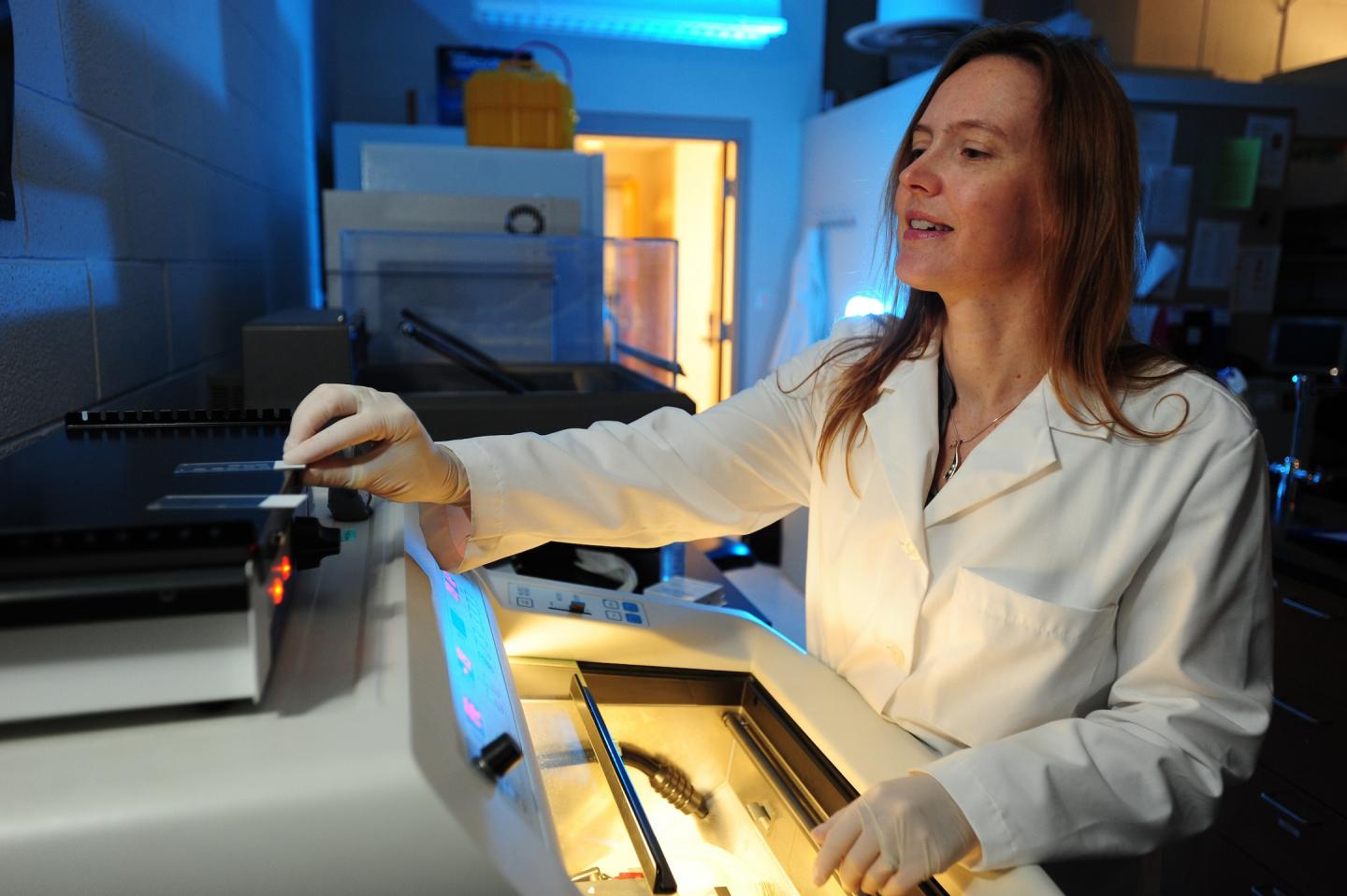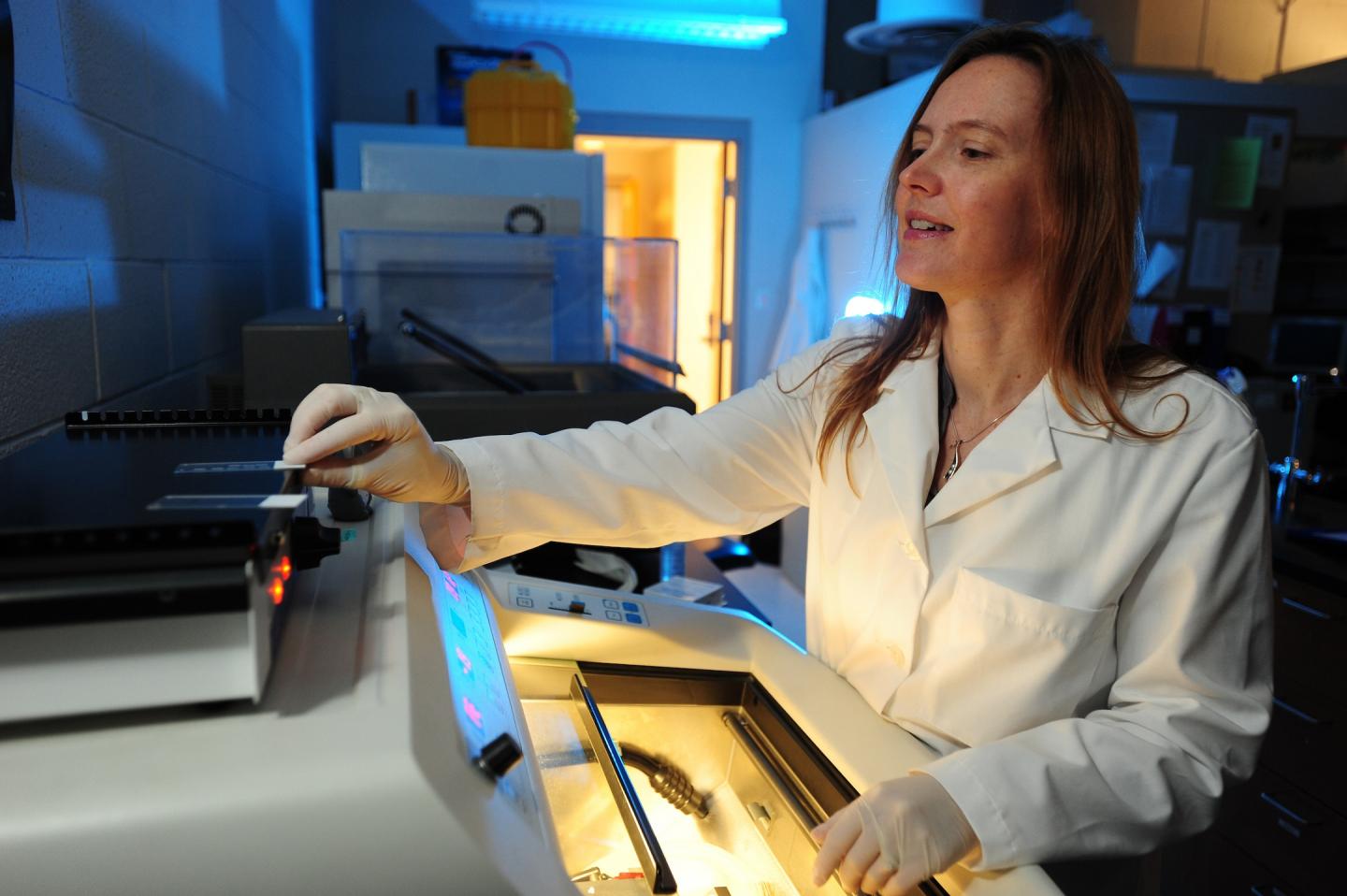
Credit: Kent State University
Heather Caldwell, Ph.D., a professor in Kent State University's Department of Biological Sciences, recently received a $450,000 grant to study the role that oxytocin plays in the developing brain.
Labeled by some as "the bonding hormone," oxytocin is well known for helping pregnant mothers with uterine contraction while in labor, milk letdown while breastfeeding and a feeling of euphoria when cuddling with their infants. But, there is still much that researchers do not know about how this hormone works in the brains of children.
The grant, which came from the National Institutes of Health's Eunice Kennedy Shriver National Institute of Child Health and Human Development, will enable a study on the three-year project titled "Sex differences in the developing oxytocin system." The study will provide insight into how oxytocin affects the development of the female and male brain and contributes to the neural regulation of social behavior. Dr. Caldwell's lab group will be the first to examine the function of oxytocin signaling during early development. Liz Aulino, a Kent State Ph.D. student in Dr. Caldwell's lab, will focus on this topic for her dissertation.
"This research has relevance to public health because many of the neural chemicals, neural substrates and circuits that underlie social behaviors are evolutionarily conserved," Dr. Caldwell said. "Using an animal model, we hope to improve our understanding of the contributions of oxytocin to the development of social behaviors in humans."
The researchers aim to determine how the developing oxytocin system differs between female and males and also to identify how it differentially impacts their neurochemistry.
The brain hormones do not themselves cause behavior, but they modulate it. The key is how they interact with a receptor, in this case, a protein in the cell's membrane. The developing mouse brain does not make oxytocin early in development, but it has oxytocin receptors ready to signal.
Emerging evidence shows that, during early brain development, oxytocin helps to organize neural circuits in the brain and that these organizational effects may help the brain develop the capacity to execute sex-specific and context-appropriate social behaviors later in life.
"We think these experiments will reveal a novel role for oxytocin in organizing sex-specific brain circuits that are critical for typical displays of social behaviors," Dr. Caldwell said. "Across mammalian species, oxytocin is important for social cognition and social functioning, and deficits in social behaviors are characteristic of several neurodevelopmental neuropsychiatric disorders such as schizophrenia."
This type of National Institutes of Health grant, an R15, is an Academic Research Enhancement Award (AREA) and specifically supports the research, education and training of future scientists through undergraduate research support for students interested in a career in biomedical/behavioral science. Dr. Caldwell will recruit students to collaborate with her and Ms. Aulino, as well as a technician who she plans to hire for the three-year term.
Dr. Caldwell developed an interest in the effect of hormones on behavior after doing fieldwork with sea turtles and working on mouse chemical signals as a student at the University of North Carolina Greensboro, where she earned her undergraduate and master's degrees in biology. Her interest in how hormones affect behavior led her to pursue a doctorate at Georgia State University, which has a large National Science Foundation-supported Center for Behavioral Neuroscience. She spent four years as a postdoctoral fellow at the National Institutes of Health and joined the Kent State faculty in 2007. Dr. Caldwell has been studying how neurochemistry regulates behavior such as aggression, and her primary research focus has been on the closely linked hormones oxytocin and vasopressin.
###
For more information about Kent State's Department of Biological Sciences, visit http://www.kent.edu/biology.
Photo Caption:
Heather Caldwell, Ph.D., professor of biological sciences at Kent State University, was awarded a $450,000 grant to study how oxytocin affects the development of the female and male brain.
Media Contacts:
Jim Maxwell, [email protected], 330-672-8028
Emily Vincent, [email protected], 330-672-8595
Media Contact
Heather Caldwell
[email protected]
330-672-3636
@ksunews
http://www.kent.edu/
Original Source
http://www.kent.edu/kent/news/new-study-kent-state-researcher-examine-role-oxytocin-developing-brain





